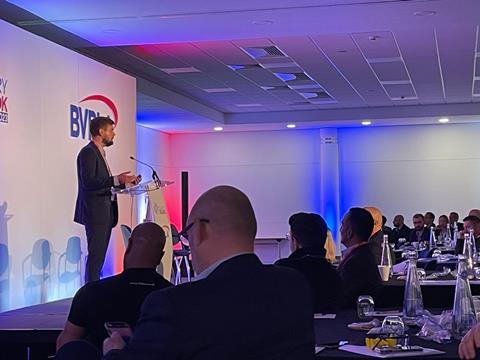
A record audience of over 200 delegates gathered at the British Motor Museum in Gaydon also heard that vehicle OEMs, worried about the zero emission vehicle (ZEV) mandate which requires 10% of all new vans sold in Great Britain in 2024 to be zero emission, are starting to push battery electric vehicles into the rental and leasing sector faster than its customers want to take them.
Alfonso Martinez, CEO of ALD Automotive and LeasePlan UK, asked: “Is the infrastructure ready for electric vans? What will the OEMs do if they don’t hit the ZEV numbers?”
Per Voegerl, CEO of United Rental Group, owner of a network of over 550 independent vehicle rental businesses which collectively run the largest rental fleet in the UK, said the rental industry would have to “lift a lot of the weight” when it came to the ZEV mandate. “But the industry is not ready so there is no demand,” he said. “Electric vehicles will be a big challenge next year.”
The conference saw the launch of the BVRLA’s annual Industry Outlook Report, which surveyed the association’s more than 1,000 members. Leasing companies reported that key LCV manufacturers have either closed their order books or cited delivery times of up to a year, and “have almost doubled their prices”. This is closing the gap between the cost of new diesel and electric vans but the report also said the leasing companies reported “extremely limited demand for used electric LCVs”.
“The residual value of an EV is far from clear,” said Martinez. “Some forecasts are still telling us we should be reselling at 60% of the new value but that is not happening. We are taking big bets and will continue to do so but I have no clue what will happen.”
Voegerl agreed, saying the RV of a one-year-old diesel van was 5% to 6% below the purchase price. “If you look at the best situation with an EV it is 30% to 40% lower,” he said. “That does not work for vehicle rental and that is why we don’t rent Ferraris! That gap has to come down either through an increase in used values or a pricing adjustment by the OEMs.”
He also called on franchised dealers to “get more involved” in remarketing used EVs. “My local dealer does not have a single used EV on the forecourt,” he complained. “There has to be a secondary market and it has to be on the forecourt not at the back of the dealership.”
Nathan Holdcroft, a director of car and van rental firm Total Fleet UK, and a self-confessed “EV fanatic”, said that he was having to keep on three-year-old EVs because the RVs were too low to allow them to be sold. “It’s worse on vans than cars,” he said. “We want to sell them because three years is long enough on a rental fleet.”
Michelle Miles, head of ProGreen and group marketing at commercial vehicle contract hire specialist Prohire, said supplies of new vehicles were “still challenging – but better than we had expected”.
She went on: “The cost of diesel vehicles is still very high. I can get an eTransit quicker and cheaper than a diesel Sprinter.”
While convincing operators that EVs can do as good a job at the same or lower total cost of ownership was still an uphill battle, Miles said it was one that could be won.
“With EVs, a lot more can be achieved but you need to put the time in with customers to learn the art of the possible,” she said. “Then innovation becomes business as usual.”
Shortages of new HGVs means Prohire is diverting trucks ordered for its rental fleet to leasing customers who were now looking to renew their fleets. “Hesitation has become a need,” she said. “New technology is saving CO2 emissions and that opens the door to alternative fuels. There is something there for every weight category, be that battery electric, hydrogen or HVO.”
Larger fleets often took longer to convince to make the switch than smaller operators with quicker decision-making, and it was much easier to work with existing customers to learn their operating model and identify “the low-hanging fruit” of easy-to-electrify operations than work on new customers. “We need to make it simple,” she said. “We can learn with our existing customers and then take those learnings to new customers. Then we have the confidence to take it up the weight ranges.
“Operators will then see the benefits of customer visibility and contract wins. It is easy to leave it for another buying cycle but this [decarbonisation] is happening whether we like it or not.”
Thomas McLennan, head of policy and public affairs at the BVRLA, said that one of the association’s key policy focus areas for the coming year was support for commercial vehicle rental and leasing, including more fiscal support for zero emissions as the “maths does not add up”.
“The government has not done enough to speed up the transition [to zero emissions] for commercial vehicles,” McLennan said. “There is no alignment of policy and reality.
“We need to unlock the potential for rental as that will have a pivotal role in delivering decarbonisation.”
The BVRLA wants to see “full alignment” of 4.25-tonne zero emissions vans with diesel equivalents and improved public and private charging facilities which currently “do not work for vans and trucks”.
Steve Furby, national CV sales manager at Ford Motor Company, agreed, saying that the lack of charging infrastructure remained the biggest barrier to wider adoption of electric vans. “If you are reliant on public charging the cost does not add up,” he said. “When you get a good charging solution either at home or at the depot they make financial sense.”













